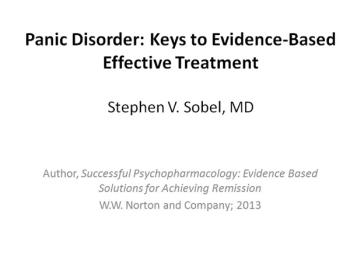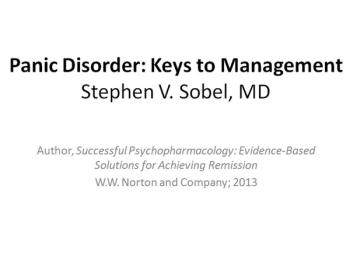
Keys to the management of panic disorder include appropriate use of psychotropic medication and psychotherapy predicated on an understanding of the disorder's biopsychosocial underpinnings. Here, Stephen V. Sobel, MD, focuses on treatment options.

Keys to the management of panic disorder include appropriate use of psychotropic medication and psychotherapy predicated on an understanding of the disorder's biopsychosocial underpinnings. Here, Stephen V. Sobel, MD, focuses on treatment options.

Keys to the management of panic disorder include appropriate use of psychotropic medication and psychotherapy predicated on an understanding of the biopsychosocial underpinnings. More in this podcast.

In this video, Dr H. Blair Simpson gives a brief overview of the hallmarks, themes, and common comorbidities found in OCD.

The art of living is the ability to use life’s inevitable traumas in some constructive fashion. This occurs on an odyssey that the resilient take that could be termed “the Journey of the Traumatized Hero.”

The extent to which antidepressant use during pregnancy is associated with increased risks of postnatal adaptation syndrome, persistent pulmonary hypertension in the newborn, first-trimester teratogenicity, stillbirth, and infant mortality is explored in 2 recent studies. A close up look here. . .

According to the CDC's latest published report, there were 38,364 suicides in the US in 2010-an average of 105 each day. Globally, an estimated 1 million suicides occur annually.

Mindfulness training is a viable treatment tool that rivals psychopharmaceutical agents for the treatment of addiction, anxiety, depression, and other psychiatric disorders.

The issue of context and its relationship to disorderness extends well beyond panic attacks: it arises in nearly all psychiatric diagnoses not explicitly defined contextually.

Panic attacks are nearly always pathological and disordered states, even when they occur in an understandable context.

Migraine, particularly chronic migraine, as well as other chronic headaches, have high rates of comorbidity with mood and anxiety disorders.

Comorbid depressive and anxiety disorders are commonly seen in both primary care and the specialty setting. Such comorbidity can present as major depression with subsyndromal anxiety symptoms or unipolar/bipolar depression with an anxiety disorder.

James Dao reports in the New York Times that the military is considering 2 steps to reduce its startling rate of active duty suicides-which is approaching an unacceptable one suicide every day. Both measures are completely sensible, but neither goes nearly far enough.

With understandable urgency, Secretary of Defense Leon Panetta has made suicide one of his top priorities, instructing commanders at all levels to feel acutely accountable for it. The numbers are startling. On average 1 active duty soldier is killing himself each day--twice the number of combat deaths and twice the civilian rate.

After scoring high on the Panic Disorder Severity Scale, this patient sought panic-focused psychodynamic therapy.

Importantly for lay and clinician readers alike, the book Monkey Mind: A Memoir of Anxiety reads as humor-laced triumph with many lost battles along the way rather than enduring unrelenting tragedy.

How can clinicians reliably identify comorbid drug and alcohol use disorders in patients with anxiety disorders?

ADHD has been significantly associated with a primary diagnosis of impulse control disorder and bipolar disorder and most commonly associated with social phobia and major depressive disorder. Details here. . .

For this psychiatrist, group therapy has proved to be an extraordinarily effective treatment for a range of mental disorders.

How often do insomnia and anxiety disorders coexist? And how best to treat patients with comorbid insomnia and anxiety? Answers here..

Perinatal anxiety disorders are common and pose risks to women and their offspring. Here, Laura Miller, MD, speaks briefly on panic disorder, PTSD, and OCD during pregnancy and post-partum, and she offers strategies for crafting effective treatment plans.

This psychiatrist was not prepared for the scope of impact our two long wars have had on military children.

Depression, PTSD, panic disorder, and abuse of alcohol and drugs are more insidious, quieter forms of illness that can cause the same desperation and disability as psychotic disorders.

Anxiety disorders are a frequent occurrence in pregnancy. While some worries and anxiety are experienced by more than 50% of pregnant women, a full-blown anxiety disorder involves risk to both mother and fetus and increases the risk of postpartum depression.

Anxiety disorders occur in 18% to 28% of the US general population during any 12-month period. In anxiety disorder, there is a 33% to 45% 12-month prevalence rate for a comorbid substance use disorder (SUD).

In this article, we attempt to leverage state-of-the-art research findings to provide empirically informed perspectives and practices related to these issues.